Russian Orthodox Church and Evangelical Church in Germany hold joint conference on Martyrs, Martyrdom, Christian Witness
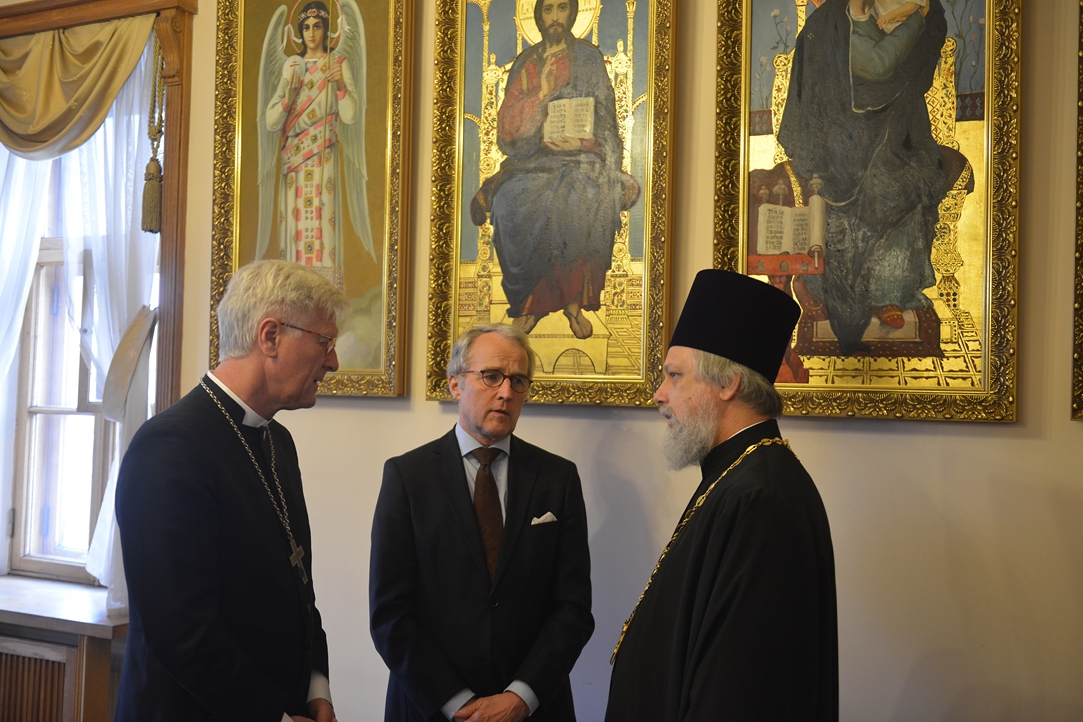
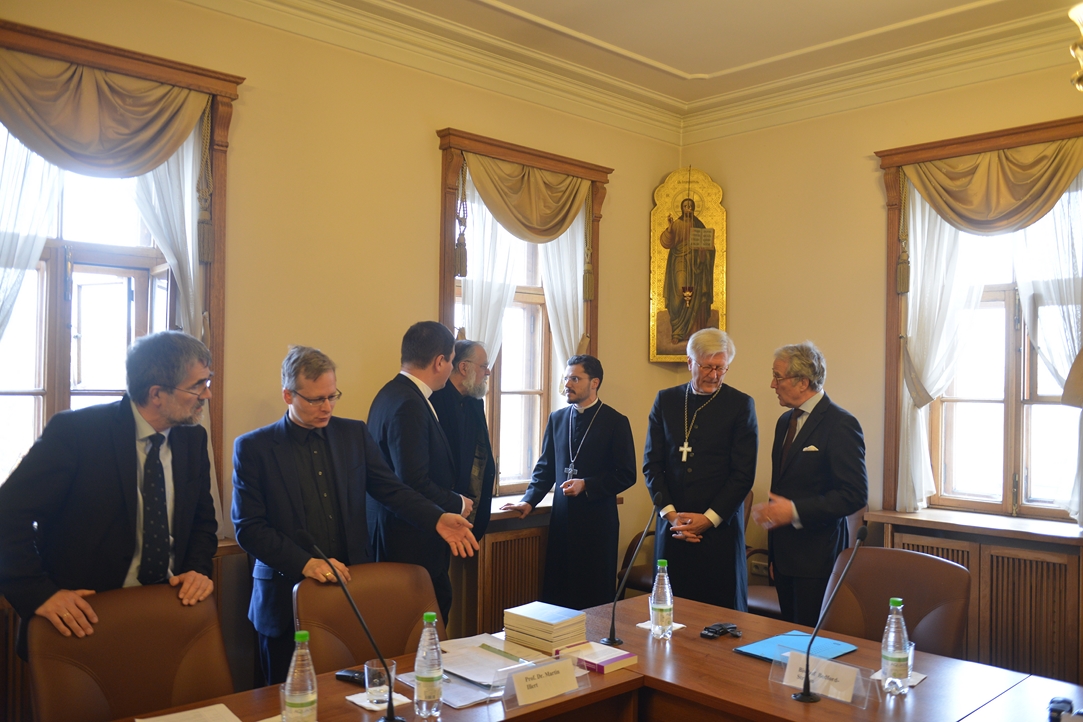

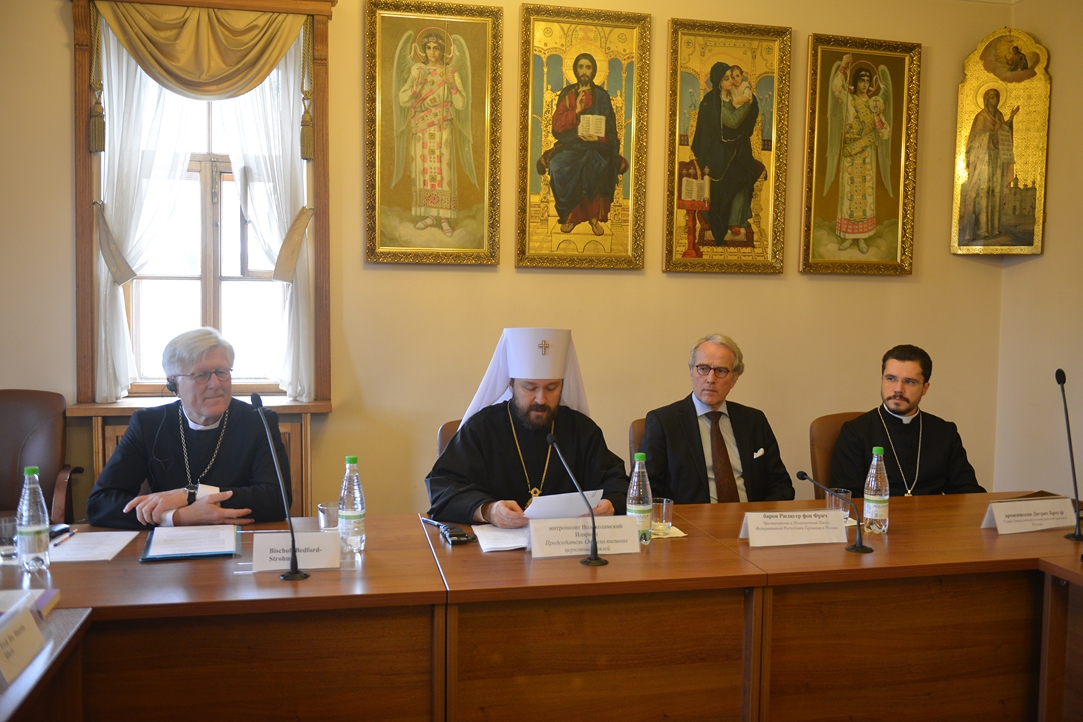






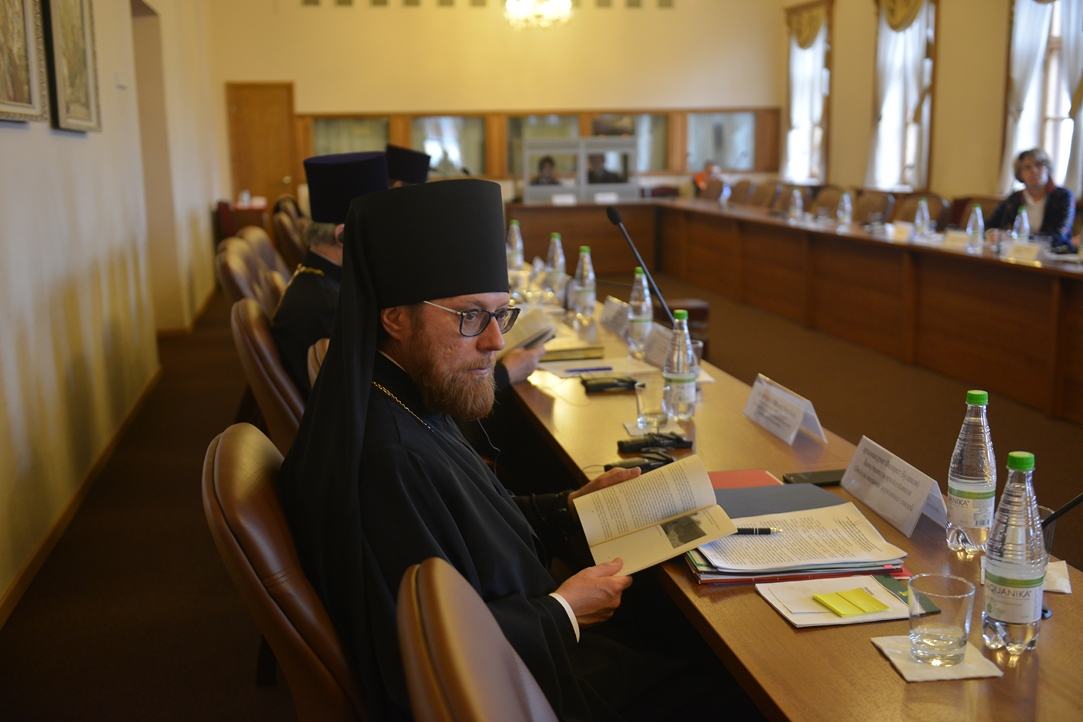



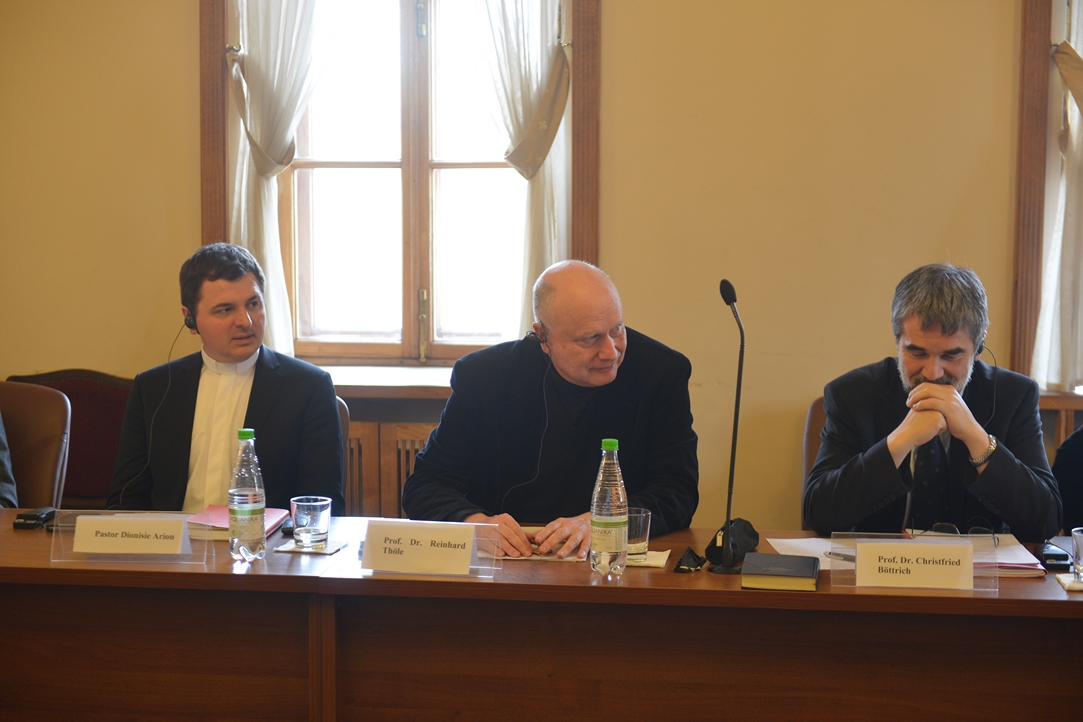
November 2, 2017 – A joint conference of the Russian Orthodox Church and the Evangelical Church in Germany on Martyrs, Martyrdom, Christian Witness opened at the grand hall of the Department for External Church Relations (DECR).
The Russian Orthodox Church is represented by Metropolitan Hilarion, DECR chairman – head of the delegation, Archimandrite Philaret (Bulekov), DECR vice-chairman, Archpriest Kirill Kaleda, rector of the church of the Russian Church’s Martyrs and Confessors at Butovo and member of the synodal canonizations commission, Archpriest Alexander Ilyashenko, rector of the church of the All-Merciful Saviour in the former Monastery of Our Lady the Joy to All the Afflicted, Hieromonk Stephan (Igumnov), DECR secretary for inter-Christian relations, Rev. Mikhail Asmus, lecturer, St. Tikhon Orthodox University of the Humanities, Ms. Margarita Nelyubova, DECR staff member, Ms. Yelena Speranskaya, DECR adviser, and I. Kashitsyn, DECR staff member.
The participants in the joint conference from the Evangelical Church in Germany are as follows: Chairman Bishop Bedford-Strohm – head of the delegation; Prof. Dr. Christfried Böttrich, University of Greifswald; Rev. Dionysus Arion, Bread for the Work diakonical organization; Prof. Martin Illert, Hannover; Prof. Dr. Martin Tamcke, University of Gottingen; Prof. Dr. Reinhard Thöle, Martin Luther University of Halle-Wittenberg; P. Susanne Fleischer, Prof. Dr. Dagmar Heller, and Prof. Dr. Jennifer Wasmuth.
The first part of the conference was devoted to the topic ‘Persecution of Christians in Today’s World. Efforts of the Churches to Help Christian Communities in the Middle East’.
Before the meeting began, the participants honoured by the minute of silence the memory of Archbishop Feofan of Berlin and Germany and Probst Siegfried Kasparick, longstanding participants in the dialogue.
In his opening remarks Metropolitan Hilarion expressed hope that the second joint conference as part of the dialogue between the Russian Orthodox Church and the Evangelical Church in Germany will be no less successful than the previous meeting that took place in 2015 in Munich.
His Eminence noted that the year 2017 marks the 500th anniversary of the Reformation and said that representatives of the Russian Orthodox Church took part in numerous celebrations and conferences taking place in Germany and Russia on the occasion. ‘In our country the initiative to hold such celebrations belongs to Archbishop Dietrich Brauer and the Evangelical Lutheran Church in Russia with active participation of the embassy of the Federative Republic of Germany. Active cooperation during this year will certainly bring forth its fruits in the future as well’, he said.
‘Our present conference’, he continued, ‘is taking place on the eve of the national holiday, the Day of People’s Unity. This new holiday was established at the initiative of the Interreligious Council in Russia consisting of the leaders of the traditional religious associations in the country. Celebrated on November 4, this holiday has not been chosen accidentally at all. It is also the day of church celebrations in honour of the Icon of Our Lady of Kazan, and the tradition of its veneration is closely bound up with the topic of people’s unity’.
The archpastor also drew the attention of the gathering to the centenary of the October revolution marked this year. Among its consequences was unprecedented persecution against the Church. ‘Precisely for this reason we have devoted the present meeting to the topic of martyrs and Christian witness’, he stressed, ‘Regrettably, this problem is relevant today too. We will consider the situation of persecuted Christians, our contemporaries who are suffering in the Middle East countries and standing in urgent need of effective aid. Let us recall Job the Long-Suffering: ‘After Job had prayed for his friends, the Lord restored his fortunes’ (Job. 42:10). But we will speak not only of prayer but also possible joint actions for saving Christianity in the lands where apostles used to preach’.
The conference will also discuss the important topic of Christian witness before the world, His Eminence Hilarion said, noting that it is precisely about what and how to speak about Christ to our contemporaries who are mostly unbelievers. Churches’ attitudes differ here, but I am confident we are in for interesting and essential discussions’.
Bishop Bedford-Strohm greeted the participants on behalf of the Evangelical Church in Germany, pointing to the importance of continued dialogue between the two Churches, which takes place today in the form of conferences. He also pointed out the relevance of the theme of the meeting. The topic of ‘martyrdom and suffering of our brothers in the Middle East unites Christians’, he said.
In his remarks, the chairman of the Council of the Evangelical Church in Germany also noted that among the priority areas for bilateral inter-church cooperation is interaction of the academic sphere.
The head of the Evangelical Lutheran Church in Russia, Archbishop D. Brauer, in his greeting remarks said in particular that numerous activities are held in Russia to mark the 500th anniversary of the Reformation. He also mentioned the exhibition and the book jointly prepared together with the International Union of German Culture and devoted to well-known home pastors many of whom suffered martyr’s death in the years of Soviet power. ‘For us, martyrs are those who fearlessly and courageously confessed their faith in defiance of all the situations, even the hardest and the most hellish ones, in defiance of death itself. Martyrs are those who handed down their faith to us at the price of their own blood, following Christ the Lamb of God’, Archbishop Brauer stressed.
German Ambassador Rüdiger von Fritsch, in his message of greetings, pointed to the importance of dialogue between Christians in Russia and Germany. He spoke of today’s common challenges facing us and of the 20th century grave consequences for Christians in the both countries. As a visible testimony to ties between Christians in Russia and Germany the ambassador referred to the fact that among the sculptural images of the 20th century martyrs at the western façade of the Westminster Abby, there stand statues of the Protomartyr Duchess Elizabeth Feodorovna and German Lutheran pastor Dietrich Bonhoeffer.
‘I am glad that you have mentioned the statue at the portal of the Westminster Abby in London’, Metropolitan Hilarion responded, ‘because I was somewhat involved in choosing the martyr presented there. When the Church of England decided to fill those ten empty niches by images of martyrs representing various Christian confessions, an appropriate letter was sent to the Moscow Patriarchate Department for External Church Relations. At that time I was the DECR secretary for inter-Christian relations. The letter asked, ‘Which martyr you would like to present as a symbolic figure symbolizing all the martyrs of the Russian Church?’ I did not think long, of course, about the answer that it should be Grand Duchess Elizabeth’.
The messages of greeting were followed by a report made by the DECR chairman about the persecution of Christians unfolding in various regions of the world in our days and about the efforts taken by Churches to give relief and support to Christian communities in the Middle East.
The report was followed by a discussion dealing with specific ways of help to be given to Christians in the Middles East and with problems involved in the immigration policies of European states, as well as the situation concerning refugees.
The conference will last till November 3. During their stay in Russia, the delegation of the Evangelical Church in Germany will visit the church of the New Martyrs and Confessors of the Russian Church at Butovo and the Orthodox Russia exhibition to open on November 4 at Manezh.
DECR Communication Service
